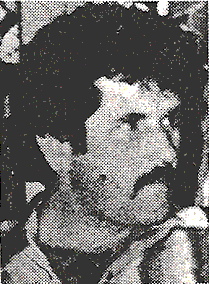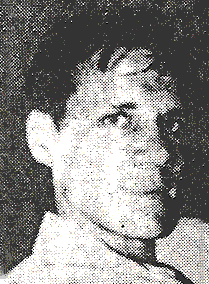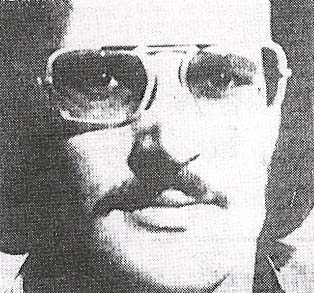|
|
|
DRUGS and death kept the "Kiwi Connection" in business for more than four years. And what a business it was. Millions made in a matter of days. A gang of addicts and one-time petty crooks living in the life of fabulous luxury. The rewards for loyalty were immense - the price paid for treason even higher. The syndicate silenced squealers with ruthless efficiency. At least a dozen couriers died as triggermen purged the flourishing organisation of security risks. Ironically the last to be killed was Marty Johnstone - victim of the cancerous greed he started spreading five years before. In 1974 he was a hard-up salesman. By the time he died in 1979 he was worth millions. So too were others who controlled the biggest dope ring Australia has ever known. Conservative estimates put the earnings of the "Kiwi Connection" in five years at 250 million N.Z. Dollars (£125 million). Authorities will never know for sure. Sinclair once bragged he was worth £50 million - give or take a million or two. And police in five countries are still looking for Johnstone's nest egg, hidden away in property, safe deposit boxes and bank accounts under a host of fictitious names around the globe. One Australian detective with years of big-time crime fighting under his belt could find only these words to describe the size of the operation: "Bloody mind-boggling". A senior officer in England put it another way: "They were spending more on phone calls in a night than we were getting in a month's salary." FearWhatever the syndicate was worth it was determined to kill to keep it. To stay in business the "grasses" had to go. One was Londoner Harry Lewis who emigrated from Manor Park in search of the good life. Instead he found a cruel death. "Pommy Harry" became embroiled in syndicate trafficking between New Zealand and Australia. He died on bail for a drugs offence because his bosses feared he had talked to his captors. |
A rough justice for the squealers ABOVE: "Pommy" Harry Lewis - found without hands or teeth. It was feared he would talk. BELOW: Isobel and Doug Wilson - they did talk and were "taken out" by a contract killer.   Last seen alive in the Sydney Hilton Hotel, he was found months later - shot and minus hands and teeth - in a New South Wales holiday resort. Lewis's execution was used by syndicate chiefs as a warning to others - but it went unheeded. Two more couriers, Greg Ollard and Julie Thielman, vanished after word reached the gang the couple were being tailed by police. They were addicts and could not be trusted to stay silent. Police are sure their bodies lie beneath the runway at Sydney Airport. For almost three years bodies turned up all over Australia. Margaret Clayton, 26, was shot twice in the head as she worked in a Melbourne massage parlour. Mary Hission, 24, was found shot and tied to a ship's anchor at the bottom of Sydney Harbour. |
The remains of the body of a young man were discovered on the outskirts of Melbourne with at least 12 stab wounds in the back. Another man was found hanging from a tree in New South Wales. The Killings stretched overseas. A gunman shot dead 17-year-old Margaret Bell outside a nightclub in Aukland, New Zealand. Yvonne Crosby and her six-year-old daughter Lisa were gunned down in Eastern France. But the murders which brought police nearest of all to the syndicate came on Good Friday, 1979, when Doug and Isobel Wilson were "taken out" by a contract killer. The couple, who together had a heroin habit costing £40,000 a year, talked at length when arrested for trafficking in Brisbane. They named names and spoke of corrupt officials. Soon after release they were lured from their luxury home in Sydney and shot in Melbourne. The "hit man" - cold blooded when faced with two traitors - could not bring himself to kill their pet dog. Then he made an uncharacteristic error. He broke the terms of his £120,000 contract and buried their bullet-riddled bodies in a shallow grave instead of putting them through a meat mincer as ordered. Not long after they were found, police began closing in on the people named by the Wilsons to narcotics agents in Queensland. Arrests might have resulted but for tip-offs from the syndicate's corrupt contacts. The organisation had penetrated the Federal Bureau of Narcotics in Canberra and had been making use of information from its giant computer. The discovery rocked the nation and led to a full-scale inquiry. Warrants were issued for two men - one of them Sinclair. His face, in various disguises, was shown on television and in newspapers all over Australia. But the slightly-built New Zealander had already fled the country. Later, after his arrest in Britain, he was to boast his sources were so good the organisation would be tipped off within minutes. He was even able to buy the tape of the Wilsons talking to police in Brisbane. "I've got money and money buys anything," he told a Lancashire detective. |
The syndicate had contacts in many fields helping its sordid business to flourish. Fake passports, birth certificates and other official documents were all bought for a price. The "Kiwi Connection" had the money and the expertise. It even ran a school for smugglers where new couriers were trained to beat the customs net. SympathyThey were mostly attractive women, dressed in fine clothes and dosed with valium to keep their cool. Dirty clothes were packed against false compartments of suitcases to discourage a closer look and for sympathy. Drug pockets were lined with plastic or fibreglass to make them undetectable even by trained "sniffer" dogs. Couriers got £1,000 a trip and risked the death penalty in the far East to make their bosses millionaires with every consignment. When Lancashire police finally broke the operation wide open in 1979 they found it had more than 90 people around the world. Sinclair and a handful of assorted ranks were under lock and key. But the vast majority were free and went rapidly to ground. For a time they left an empire in ruins, addicts without supplies. In New Zealand heroin all but vanished from the streets. KillingsBut soon the inevitable battle began for control of what was left. New distributors moved in to push supplies around the Australian continent. Only last December four were arrested bringing £750,000 worth of heroin through Sydney Airport. One was the man whose picture appeared next to Sinclair's on wanted posters after the Wilsons' killings. Police in Britain, New Zealand and Australia are justifiably proud to have destroyed one evil supply line. But they know only too well others have already taken its place. |


